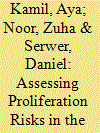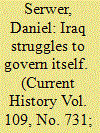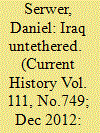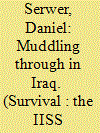| Srl | Item |
| 1 |
ID:
192146


|
|
|
|
|
| Summary/Abstract |
Whether the Iran nuclear deal rises from the ashes or not, the United States and Europe now need to focus on preventing a nuclear arms race in the Middle East. Turkiye and Saudi Arabia are the most likely to respond to Iran’s becoming a nuclear-threshold state. Both have good reasons to think twice before proceeding, but their current leaders have made statements that arouse concern. Egypt might find it hard not to follow in their wake. With Israel and Iran, there would then be a prospect of five rivalrous nuclear powers in close proximity in a volatile region. Avoiding this scenario will require careful analysis of nuclear capabilities in the potential proliferating states; intense diplomacy among the US, Europe and the potential proliferators; and a broader regional-security framework for threat assessment that does not exist today.
|
|
|
|
|
|
|
|
|
|
|
|
|
|
|
|
| 2 |
ID:
100134


|
|
|
| 3 |
ID:
118263


|
|
|
|
|
| Publication |
2012.
|
| Summary/Abstract |
Iraq is still in search of internal equilibrium and its proper international role after the trauma of more than thirty years of Saddam Hussein's dictatorship and eight years of American military occupation…
|
|
|
|
|
|
|
|
|
|
|
|
|
|
|
|
| 4 |
ID:
122004


|
|
|
|
|
| Publication |
2013.
|
| Summary/Abstract |
Writing for the Washington Post in April, Iraqi Prime Minister Nuri al-Maliki argued that 'the United States has not "lost" Iraq. Instead, in Iraq, the United States has found a partner for our shared strategic concerns and our common efforts on energy, economics and the promotion of peace and democracy.' A lot of people in the United States do not see it that way. They regard Iraq's democratisation efforts over the course of eight years as wasted. Many Americans view Maliki as increasingly sectarian and authoritarian, and aligned with Iran, especially in his support of Syrian President Bashar al-Assad, an important ally of Tehran. They see little of Iraq's vast oil wealth trickling down to benefit its population. They wonder whether Iraq can survive as a single state as relations between Baghdad and the Kurdistan capital of Erbil deteriorate; Sunnis block major roads in protest against Maliki; the government prevents demonstrations in Baghdad and predominantly Sunni insurgents continue to carry out bombings.
|
|
|
|
|
|
|
|
|
|
|
|
|
|
|
|